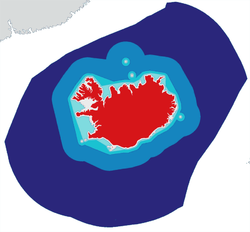Cod Wars
The Cod Wars, also called the Iceland Cod Wars (Icelandic: Þorskastríðin, "the cod wars", or Landhelgisstríðin, "the wars for the territorial waters"[1]) were a series of confrontations in the 1950s and 1970s between the United Kingdom and Iceland regarding fishing rights in the North Atlantic. The name of the conflict was a pun on the term "Cold War" (with "cod" reading so similarly to "cold"), by the British tabloid press.
In 1972, Iceland declared an Exclusive Economic Zone extending beyond its territorial waters, and plans to reduce over-fishing. It policed its quota system with the coast guard, leading to a series of net-cutting incidents with British trawlers that fished the areas. As a result, a fleet of British Royal Naval warships and tug-boats was employed to act as a deterrent against any future harassment of British fishing crews by Iceland.
In 1976, a compromise between the two states allowed a maximum of 24 British trawlers access to the disputed 200 nautical mile (370 km) limit. Two-hundred-nautical-mile Exclusive Economic Zones became recognized internationally on November 14, 1994, after having been agreed at the conference on the Third United Nations Convention on the Law of the Sea (UNCLOS) in 1982.
Cod Wars Media
Expansion of the Icelandic exclusive economic zone (EEZ).* Iceland* Internal waters* 4 nmi expansion 1952* 12 nmi expansion (current extent of territorial waters) 1958* 50 nmi expansion 1972* 200 nmi expansion (current extent of EEZ) 1975
Sea areas, in international law, did not become universally recognised until the United Nations Convention on the Law of the Sea of 1982.
The primary objective of the Icelandic Coast Guard during the last two Cod Wars was to cut nets in this manner.
The current exclusive economic zones of Iceland, the Faroe Islands, the United Kingdom and of Ireland.
References
- ↑ The Icelandic Coast Guard's name in Icelandic directly translates as "Territorial waters Guard".



